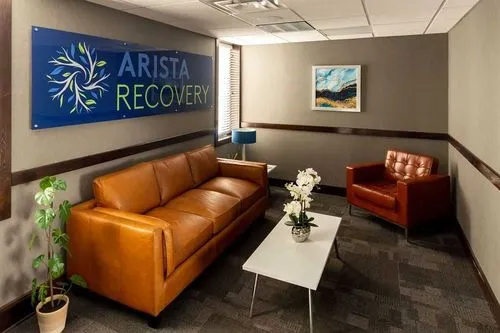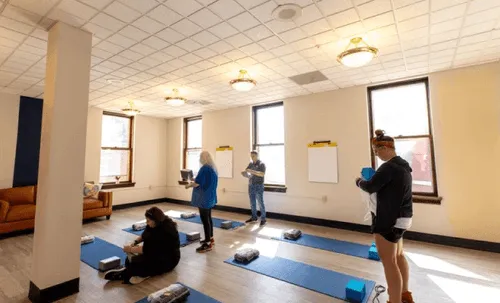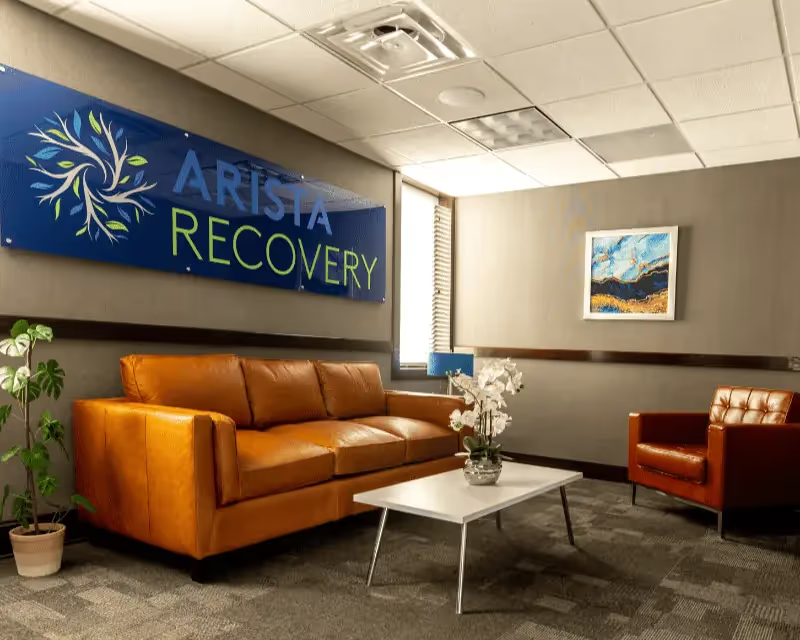KANSAS DUAL-DIAGNOSIS TREATMENT


Dual-Diagnosis & Addiction
If you or someone in your family is struggling with addiction and mental health disorders you will need Kansas City dual diagnosis treatment. Arista offers high-quality services for co-occurring disorders; we treat mental health issues at the same time that we treat addiction so that you can overcome both and work toward long-term sobriety.
Arista can help you start dual diagnosis rehab in Kansas City today. Call us today to learn about our mental health and addiction treatment programs in Kanas.
What are Dual-Diagnosis Disorders?
There is a strong correlation between mental health disorders and substance abuse disorders.
Fact: People with any mental health condition are twice as likely to struggle with substance abuse as those without a mental health condition.
Drug abuse can lead to changes in the brain structure and size which allow the development of mental health disorders in people who didn’t previously have them. It can also exacerbate symptoms and signs of mental health disorders in people who previously had them.
Without proper Kansas City co-occurring disorder treatment, triggers in the environment like a traumatic event, persistent anxiety, or chronic stress can lead to mental health issues, addiction, or both.
Your genetic predisposition might leave you more susceptible to developing a mental health disorder and substance abuse. Research indicates that an average of 50% of your susceptibility to addiction is related to your genetics.
Arista Recovery is a drug and alcohol rehab center in the Midwest. Reach out to Arista today to learn more about our Kansas City dual diagnosis treatment.
Make the Call That Will Change Your Life
Speak to one of our caring intake coordinators 24 hours a day, 7 days a week.
What We Do
Treatment Programs at Arista
How Dual-Diagnosis Effects You
Unfortunately, people end up self-medicating without the proper Kansas City dual diagnosis treatment.
Fact: 45% of people struggle with dual-diagnosis disorders.
People who are given a misdiagnosis of depression when they have bipolar disorder will find that the medication they are on may not be effective . This frustration might lead to self-medication.
When people are afraid of the cost or the social stigma of getting help, they might avoid therapy and turn to drugs or alcohol.
Regardless of the reason, self-medication eventually leads to addiction, and addiction leads to worse than dying or additional mental health disorders.
Too often, people in this position end up attending rehab specifically for substance abuse treatment once the addiction gets severe enough. But that addiction treatment alone isn’t specific to dual diagnosis services, so they don’t get the mental health treatment they need.
When they graduate from rehab, those same people end up struggling all over again with symptoms of mental health disorders and, eventually, self-medicating.
Disrupting this cycle requires medication in some cases and therapy in the form of Kansas City dual diagnosis treatment.
Arista offers free and confidential assessments. Call us today at 877-279-0118 to start your verification for dual diagnosis rehab in Kansas City.

How Common is Dual-Diagnosis?
Dual-diagnosis disorders are quite common. People who struggle with mental health disorders don’t always get the help they need. This can be for a variety of reasons, such as the following:
- Not knowing they have a mental health disorder
- Thinking their disorder is normal
- Receiving a misdiagnosis
- Being afraid of the cost
- Social stigmas associated with therapy or diagnosis
- Only receiving medication and not therapy from their doctor
What are Dual-Diagnosis Disorders?
There is a strong correlation between mental health disorders and substance abuse disorders.
Fact: People with any mental health condition are twice as likely to struggle with substance abuse as those without a mental health condition.
Drug abuse can lead to changes in the brain structure and size which allow the development of mental health disorders in people who didn’t previously have them. It can also exacerbate symptoms and signs of mental health disorders in people who previously had them.
Without proper Kansas City co-occurring disorder treatment, triggers in the environment like a traumatic event, persistent anxiety, or chronic stress can lead to mental health issues, addiction, or both.
Your genetic predisposition might leave you more susceptible to developing a mental health disorder and substance abuse. Research indicates that an average of 50% of your susceptibility to addiction is related to your genetics.
Arista Recovery is a drug and alcohol rehab center in the Midwest. Reach out to Arista today to learn more about our Kansas City dual diagnosis treatment.
The Most Common Dual-Diagnosis Disorders
The Diagnostic and Statistical Manual of Mental Health Disorders, Fifth Edition (DSM-5), which is what all psychiatrists have used to diagnose mental illnesses since 2013, gives names, symptoms, and diagnostic features of each disorder. Dual-diagnosis disorders can look different for everyone. But there are some common themes.
Depression affects 10% of adults throughout the US at any given time. Of those, one-third struggle with cocaine addiction. Cocaine helps to mask symptoms of depression temporarily. It is equally common for people with depression to struggle with alcoholism for similar reasons.
Anxiety is equally as common as depression, and 50% of people who struggle with depression will also have an anxiety disorder at some point. Benzodiazepines and alcohol are often abused to try and mask symptoms of anxiety.
Bipolar disorder requires lifelong treatment, but without the right diagnosis and medication, people struggle with alcoholism and stimulants during respective manic or depressive episodes.
People who struggle with PTSD often deal with chronic pain, anxiety, and depression. Symptoms can last for years after a traumatic event. For that reason, many people abuse alcohol and benzodiazepines. But one-third of people who struggle with PTSD abuse prescription opioids.
One out of every four adults who go to rehab struggles with ADHD. It’s common for people with ADHD, diagnosed or undiagnosed, to self-medicate with alcohol or benzodiazepines.
Our Unique Therapies
Explore our innovative approach to addiction treatment at Arista Recovery. From evidence-based therapies to holistic and experiential methods, we offer an immersive experience that works to treat the root causes of substance abuse our full continuum treatment programs












Educational Therapy
Explore Educational Therapy at Arista Recovery and how it can help you recover.
Cognitive Behavioral Therapy (CBT)
Explore cognitive behavioral therapy at Arista Recovery and how it can help you recover.
Dialectical Behavioral Therapy (DBT)
Explore dialectical behavioral therapy for addiction treatment and how it can help you recover.
Horticultural Therapy
Explore horticultural therapy at Arista Recovery and how it can help you recover.
Sand Tray Therapy
Explore sand tray therapy at Arista Recovery and how it can help you recover.
Experiential Therapy
Explore experiential therapy at Arista Recovery and how it can help you recover.
Synergistic Therapy
Our Synergistic Recovery Program programs in both Kansas and Ohio provides effective training, both in the physical and mental domains
Testimonials
Hear From Others in Our Recovery Community
How We Treat Dual-Diagnosis in Kansas at ARISTA RECOVERY
Our dual diagnosis Kansas City treatment starts with detox.
For addictions to things like cocaine, detox lasts for an average of 10 days.Medication management is started during this time to overcome the cravings that can last six months or more.
For addictions to opioids or alcohol, our dual diagnosis rehab in Kansas City involves medication-assisted treatment. This treatment helps to wean you from your drugs with the fewest side effects and health complications. You can start your detox at our facility over the first week of your treatment using FDA-approved medications.
Arista Recovery is a Kansas detox center that can help you overcome addiction and mental health issues. Contact us today to learn more.
Depending on your situation, we might advise medication management for your dual diagnosis Kansas City treatment. Medication management is often used for PTSD, ADHD, and even bipolar disorder.
This looks different for everyone.
Some people were given a misdiagnosis. This is quite common with individuals who have PTSD or bipolar disorder. If you were given a misdiagnosis, chances are the medication you were prescribed is insufficient or a bad fit. In these cases, you might need medical supervision as you try different medications to find those most appropriate for your situation.
Others received a correct diagnosis for mental health disorders and were given medication that simply didn’t work. People struggling with ADHD, for example, might have been given a prescription that didn’t work well and wasn’t combined with therapy.
Some people might never have received any medication but need it to initially manage symptoms of their mental health disorders. This is common in cases like depressive disorder or anxiety disorder. You might very well find that medication helps you manage the symptoms early in your recovery until you develop ongoing coping mechanisms, stress management techniques, and other life skills that you can use to control your symptoms without medication.
Medication of any kind is most effective when coupled with therapy. Without proper therapy, medication only fixes part of the problem.
Our team works hard to prescribe proper medication and manage your progress during your dual diagnosis rehab in Kansas City while concurrently ensuring you get the right therapy you need to provide long-term skills.

Get the Help You Need at ARISTA RECOVERY
Arista Recovery provides addiction treatment services at both inpatient and outpatient treatment facilities located in Kansas. Whether you need rehabilitation in an inpatient, residential setting or you would like a flexible outpatient program, Arista provides several treatment options to treat clients’ individual needs.
If you or a loved one are struggling with addiction and seeking help, please contact us for more information on how to get started. Our dedicated staff is available 24/7 to answer any questions or concerns you may have. Take the first step to recovery today.
Frequently Asked Questions About Dual-Diagnosis
When someone has a dual diagnosis of substance use disorder (SUD) and a mental health disorder, this means they have co-occurring disorders that require simultaneous treatment.
A co-occurring disorder is a substance use disorder along with generalized anxiety disorder, depression, PTSD, etc.
Treatment for co-occurring disorders is not much different than getting treatment for a SUD only. Licensed professionals will screen, assess, and determine the right path of treatment for the co-occurring disorders.
Research has shown that people who participate in integrated treatment are more likely to stay sober, see a significant reduction of their symptoms, visit the hospital less often, live independently, maintain steady employment, and report feeling happier with their lives.
.webp)









.webp)






